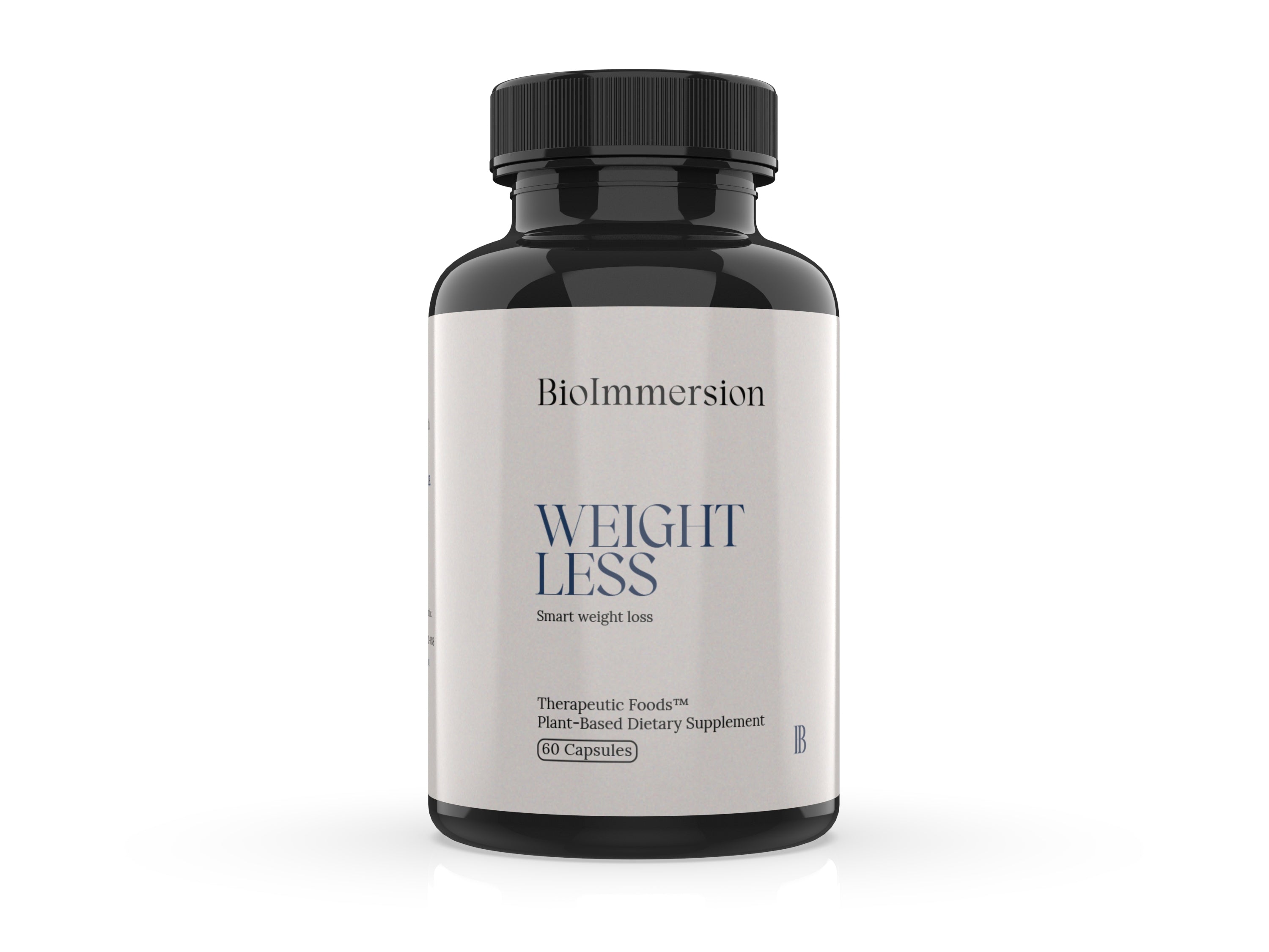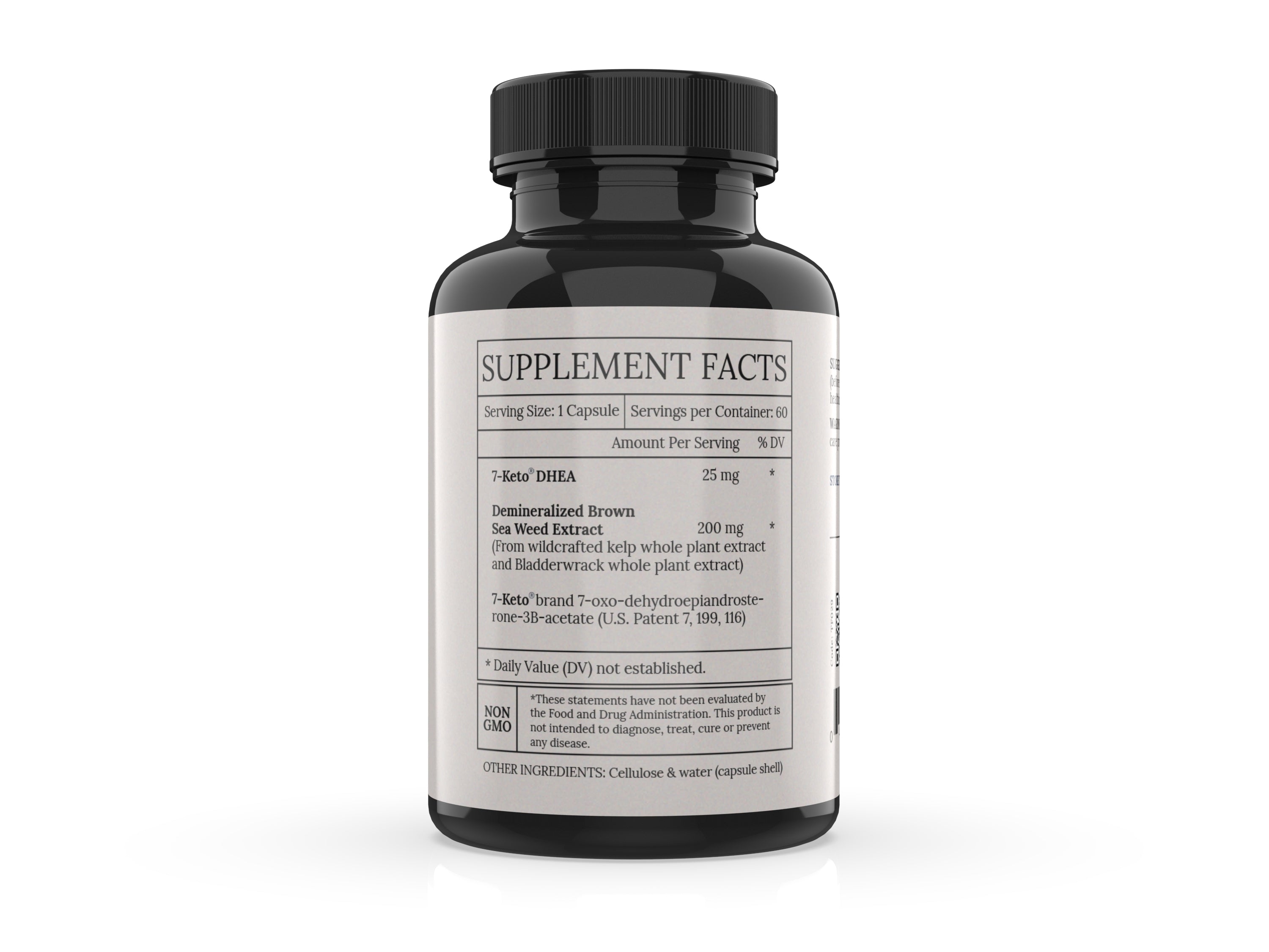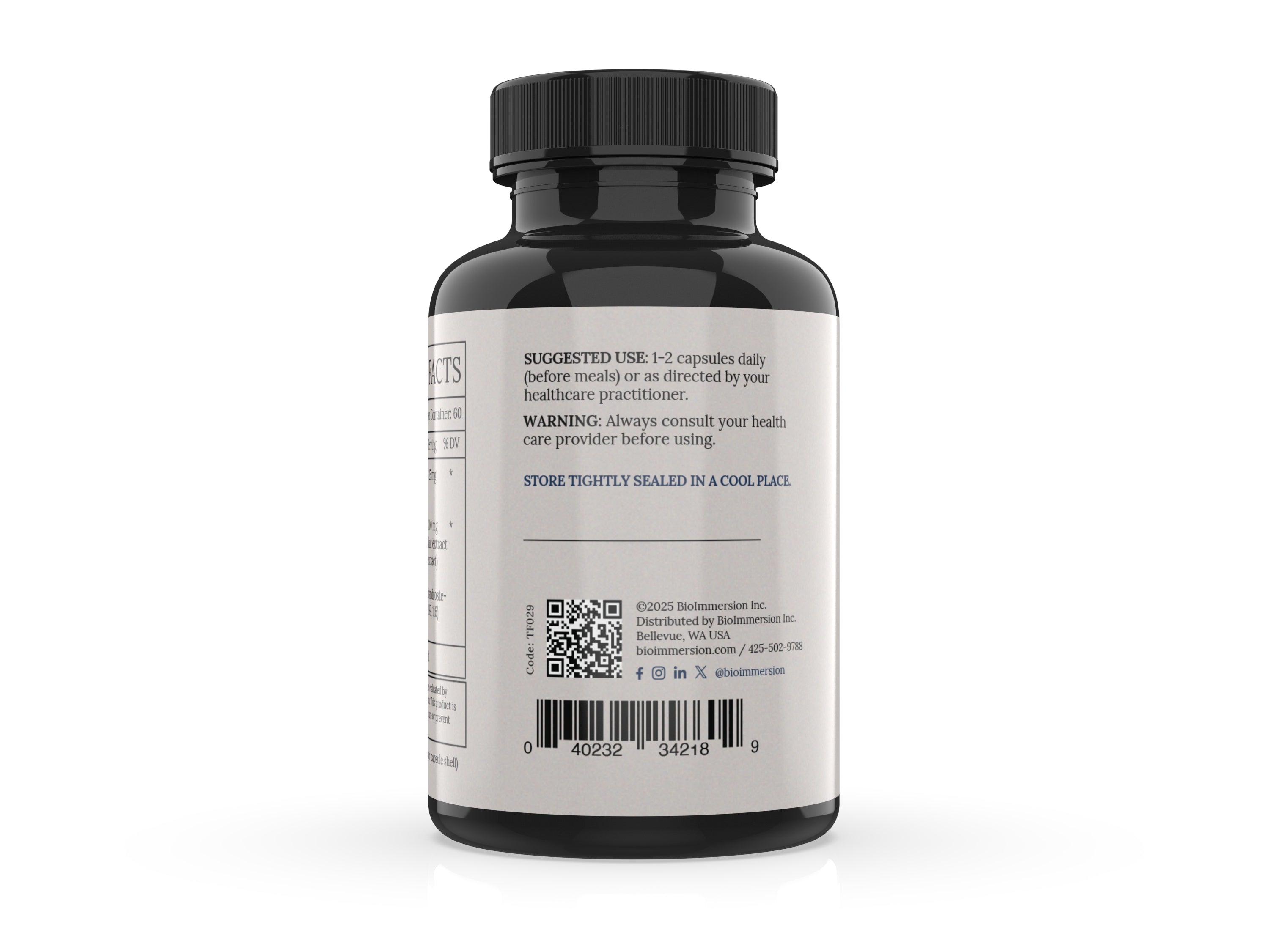


Weight-Less
A Smart Formula for Less Weight and More Energy
Weight Less is a smart formula that healthily promotes weight loss and sustained energy levels throughout the day.*
A powerful mix of wild crafted brown seaweed extracts of Ascophyllum nodosum (kelp) and Fucus vesiculosus (bladderwrack) are shown in research to manage weight reduction and support metabolic health. Moreover, wild brown seaweeds are found to contain potent marine anti-inflammatory and antioxidant factors. Together with 7-Keto DHEA, the mix turns on fat burning mechanism, lowers the glycemic level of meals, and supports sustained energy. Take 1-2 capsules a half hour before meals.*
Weight-Less is Wild Crafted (seaweeds), Organic (seaweeds), Vegan, Kosher, Non GMO, and Gluten Free.
To conserve and respect resources we will utilize the remaining original labels and bottles before they are replaced by the new bottles and label design.
Description
Research
FOOD SCIENCE: THE APPLICATION AND USE OF WILD EDIBLE BROWN ALGAE, KELP AND BLADDERWRACK, AND 7-KETO DHEA
Brown Marine Algae: Weight Loss, Metabolic Syndrome, and Glucose Homeostasis
Bahar, B., O'Doherty, J. V., Hayes, M., & Sweeney, T. (2012). Extracts of brown seaweeds can attenuate the bacterial lipopolysaccharide-induced pro-inflammatory response in the porcine colon ex vivo. Journal of animal science, 90(Supplement_4), 46-48. Abstract
Catarino, M. D., Silva, A., & Cardoso, S. M. (2017). Fucaceae: A source of bioactive phlorotannins.International journal of molecular sciences, 18(6), 1327. Article
Chater, P. I., Wilcox, M. D., Houghton, D., & Pearson, J. P. (2015). The role of seaweed bioactives in the control of digestion: implications for obesity treatments. Food & function, 6(11), 3420-3427. DOI: 10.1039/c5fo00293a
Collins, K. G., Fitzgerald, G. F., Stanton, C., & Ross, R. P. (2016). Looking beyond the terrestrial: the potential of seaweed derived bioactives to treat non-communicable diseases. Marine drugs, 14(3), 60. DOI:10.3390/md14030060
DECODE Study Group. (1999). Diabetes Epidemiology: Collaborative analysis Of Diagnostic criteria in Europe. Glucose tolerance and mortality: comparison of WHO and American Diabetes Association diagnostic criteria. Lancet, 354(9179), 617-21. Abstract
D'Orazio, N., Gammone, M. A., Gemello, E., De Girolamo, M., Cusenza, S., & Riccioni, G. (2012). Marine bioactives: Pharmacological properties and potential applications against inflammatory diseases. Marine drugs, 10(4), 812-833. DOI: 10.3390/md10040812
Gabbia, D., Dall'Acqua, S., Di Gangi, I. M., Bogialli, S., Caputi, V., Albertoni, L., ... & De Martin, S. (2017). The Phytocomplex from Fucus vesiculosus and Ascophyllum nodosum Controls Postprandial Plasma Glucose Levels: An In Vitro and In Vivo Study in a Mouse Model of NASH. Marine drugs, 15(2), 41. DOI: 10.3390/md15020041
Kahleova, H., Levin, S., & Barnard, N. (2017). Cardio-Metabolic Benefits of Plant-Based Diets. Nutrients, 9(8), 848. DOI: 10.3390/nu9080848
Kim, K. T., Rioux, L. E., & Turgeon, S. L. (2014). Alpha-amylase and alpha-glucosidase inhibition is differentially modulated by fucoidan obtained from Fucus vesiculosus and Ascophyllum nodosum. Phytochemistry, 98, 27-33. https://doi.org/10.1016/j.phytochem.2013.12.003
Lamarche, B., Paradis, M. È., & Couture, P. (2010). Study of the acute impact of polyphenols from brown seaweeds on glucose control in healthy men and women. The FASEB Journal, 24(1 Supplement), 209-4. Abstract
Lutsey, P. L., Steffen, L. M., & Stevens, J. (2008). Dietary intake and the development of the metabolic syndrome. The Atherosclerosis risk in communities study. Circulation, 117(6), 754-761. DOI: 10.1161/CIRCULATIONAHA.107.716159
Murugan, A. C., Karim, M. R., Yusoff, M. B. M., Tan, S. H., Asras, M. F. B. F., & Rashid, S. S. (2015). New insights into seaweed polyphenols on glucose homeostasis. Pharmaceutical biology, 53(8), 1087-1097. DOI: 10.3109/13880209.2014.959615
Pangestuti, R., & Kim, S. K. (2017). Bioactive peptide of marine origin for the prevention and treatment of non-communicable diseases.Marine drugs, 15(3), 67. DOI: 10.3390/md15030067
Pantidos, N., Boath, A., Lund, V., Conner, S., & McDougall, G. J. (2014). Phenolic-rich extracts from the edible seaweed, ascophyllum nodosum, inhibit α-amylase and α-glucosidase: Potential anti-hyperglycemic effects. Journal of Functional Foods, 10, 201-209. https://doi.org/10.1016/j.jff.2014.06.018
Paradis, M. E., Couture, P., & Lamarche, B. (2011). A randomised crossover placebo-controlled trial investigating the effect of brown seaweed (Ascophyllum nodosum and Fucus vesiculosus) on postchallenge plasma glucose and insulin levels in men and women. Applied Physiology, Nutrition, and Metabolism, 36(6), 913-919. DOI:10.1139/h11-115
Phillips, C. M., & Perry, I. J. (2013). Does inflammation determine metabolic health status in obese and nonobese adults? The Journal of Clinical Endocrinology & Metabolism, 98(10), E1610-E1619. https://doi.org/10.1210/jc.2013-2038
Roy, M. C., Anguenot, R., Fillion, C., Beaulieu, M., Bérubé, J., & Richard, D. (2011). Effect of a commercially-available algal phlorotannins extract on digestive enzymes and carbohydrate absorption in vivo. Food research international, 44(9), 3026-3029. https://doi.org/10.1016/j.foodres.2011.07.023
Sharifuddin, Y., Chin, Y. X., Lim, P. E., & Phang, S. M. (2015). Potential bioactive compounds from seaweed for diabetes management. Marine drugs, 13(8), 5447-5491. DOI: 10.3390/md13085447
Wan-Loy, C., & Siew-Moi, P. (2016). Marine algae as a potential source for anti-obesity agents. Marine drugs, 14(12), 222. DOI: 10.3390/md14120222
7-Keto DHEA: Metabolism, Weight-Loss and Management
Bobyleva, V., Bellei, M., Kneer, N., & Lardy, H. (1997). The effects of the ergosteroid 7-oxo-dehydroepiandrosterone on mitochondrial membrane potential: possible relationship to thermogenesis. Archives of biochemistry and biophysics, 341(1), 122-128. https://doi.org/10.1006/abbi.1997.9955
Davidson, M., Marwah, A., Sawchuk, R. J., & Maki, K. (2000). Safety and pharmacokinetic study with escalating doses of 3-acetyl-7-oxo-dehydroepiandrosterone in healthy male volunteers. Clinical and investigative medicine, 23(5), 300. Abstract [French]
Hampl, R., Lapcik, O., Hill, M., Klak, J., Kasal, A., Novacek, A., ... & Starka, L. (2000). 7-Hydroxydehydroepiandrosterone-a natural antiglucocorticoid and a candidate for steroid replacement therapy? Physiological Research, 49, S107-S112. Article
Humanetics Corporation (2005). 7 Keto Innovative Weight Loss. Retrieved from www.humaneticscorp.com.
Kaiman, D. S., Colker, C. M., Swain, M. A., Torina, G. C., & Shi, Q. (2000). A randomized, double-blind, placebo-controlled study of 3-acetyl-7-oxo-dehydroepiandrosterone in healthy overweight adults. Current therapeutic research, 61(7), 435-442. https://doi.org/10.1016/S0011-393X(00)80026-0
Lardy, H., Kneer, N., Wei, Y., Partridge, B., & Marwah, P. (1998). Ergosteroids II: biologically active metabolites and synthetic derivatives of dehydroepiandrosterone. Steroids, 63(3), 158-165. https://doi.org/10.1016/S0039-128X(97)00159-1
Lardy, H., Partridge, B., Kneer, N., & Wei, Y. (1995). Ergosteroids: induction of thermogenic enzymes in liver of rats treated with steroids derived from dehydroepiandrosterone. Proceedings of the National Academy of Sciences, 92(14), 6617-6619. Abstract
Lamont, B. J., Waters, M. F., & Andrikopoulos, S. (2016). A low-carbohydrate high-fat diet increases weight gain and does not improve glucose tolerance, insulin secretion or β-cell mass in NZO mice. Nutrition & diabetes, 6(2), e194. DOI: 10.1038/nutd.2016.2
Liu, Y. Y., Yang, N., Kong, L. N., & Zuo, P. P. (2003). Effects of 7-oxo-DHEA treatment on the immunoreactivity of BALB/c mice subjected to chronic mild stress. Yao xue xue bao= Acta pharmaceutica Sinica,38(12), 881-884. Abstract
Shi, J., Schulze, S., & Lardy, H. A. (2000). The effect of 7-oxo-DHEA acetate on memory in young and old C57BL/6 mice. Steroids, 65(3), 124-129. https://doi.org/10.1016/S0039-128X(99)00094-X
Šulcová, J., Hill, M., Mašek, Z., Češka, R., Nováček, A., Hampl, R., & Starka, L. (2001). Effects of transdermal application of 7-oxo-DHEA on the levels of steroid hormones, gonadotropins and lipids in healthy men. Physiol Res, 50, 9-18. Article
Zenk, J. L., Helmer, T. R., Kassen, L. J., & Kuskowski, M. A. (2002). The effect of 7-Keto Naturalean™ on weight loss: A randomized, double-blind, placebo-controlled trial. Current therapeutic research, 63(4), 263-272. https://doi.org/10.1016/S0011-393X(02)80031-5
Zenk, J. L., Helmer, T. R., & Kuskowski, M. A. (2004, March). The use of 3-acetyl-7-oxo-dehydroepiandrosterone for augmenting immune response in the elderly. In FASEB JOURNAL (Vol. 18, No. 5, pp. A794-A794). 9650 ROCKVILLE PIKE, BETHESDA, MD 20814-3998 USA: FEDERATION AMER SOC EXP BIOL.
Zenk, J. L., Frestedt, J. L., & Kuskowski, M. A. (2007). HUM5007, a novel combination of thermogenic compounds, and 3-acetyl-7-oxo-dehydroepiandrosterone: each increases the resting metabolic rate of overweight adults. The Journal of nutritional biochemistry , 18(9), 629-634. https://doi.org/10.1016/j.jnutbio.2006.11.008
Dietary Guidelines and Metabolic Syndrome
American Heart Association. (2017). About metabolic syndrome. Article
Amine, E., Baba, N., Belhadj, M., Deurenbery-Yap, M., Djazayery, A., Forrester, T., ... & Katan, M. (2002). Diet, nutrition and the prevention of chronic diseases: report of a Joint WHO/FAO Expert Consultation . World Health Organization. Diet, nutrition and the prevention of chronic diseases - World Health ...
Azadbakht, L., & Esmaillzadeh, A. (2009). Red meat intake is associated with metabolic syndrome and the plasma C-reactive protein concentration in women. The Journal of nutrition, 139(2), 335-339. DOI: 10.3945/jn.108.096297
Barclay, A. W., Petocz, P., McMillan-Price, J., Flood, V. M., Prvan, T., Mitchell, P., & Brand-Miller, J. C. (2008). Glycemic index, glycemic load, and chronic disease risk-a meta-analysis of observational studies. The American journal of clinical nutrition, 87(3), 627-637. Abstract
Calton, Emily K., Anthony P. James, Poonam K. Pannu, and Mario J. Soares. "Certain dietary patterns are beneficial for the metabolic syndrome: reviewing the evidence." Nutrition Research 34, no. 7 (2014): 559-568. DOI: 10.1016/j.nutres.2014.06.012
Gonzalez Fischer, C., & Garnett, T. (2016). Plates, pyramids, planet. Oxford, UK: Oxford University. Abstract
Hare-Bruun, H., Flint, A., & Heitmann, B. L. (2006). Glycemic index and glycemic load in relation to changes in body weight, body fat distribution, and body composition in adult Danes. The American journal of clinical nutrition, 84(4), 871-879. Abstract
Hever, J., & Cronise, R. J. (2017). Plant-based nutrition for healthcare professionals: implementing diet as a primary modality in the prevention and treatment of chronic disease. Journal of Geriatric Cardiology: JGC, 14(5), 355. DOI: 10.11909/j.issn.1671-5411.2017.05.012
Kahleova, H., Levin, S., & Barnard, N. (2017). Cardio-Metabolic Benefits of Plant-Based Diets. Nutrients, 9(8), 848. DOI: 10.3390/nu9080848
Lamont, B. J., Waters, M. F., & Andrikopoulos, S. (2016). A low-carbohydrate high-fat diet increases weight gain and does not improve glucose tolerance, insulin secretion or β-cell mass in NZO mice. Nutrition & diabetes, 6(2), e194. DOI: 10.1038/nutd.2016.2
Lutsey, P. L., Steffen, L. M., & Stevens, J. (2008). Dietary intake and the development of the metabolic syndrome. The Atherosclerosis risk in communities study. Circulation, 117(6), 754-761. DOI: 10.1161/CIRCULATIONAHA.107.716159
McMillan-Price, J., Petocz, P., Atkinson, F., O'Neill, K., Samman, S., Steinbeck, K., ... & Brand-Miller, J. (2006). Comparison of 4 diets of varying glycemic load on weight loss and cardiovascular risk reduction in overweight and obese young adults: a randomized controlled trial. Archives of internal medicine, 166(14), 1466-1475. Article
Satija, A., Bhupathiraju, S. N., Spiegelman, D., Chiuve, S. E., Manson, J. E., Willett, W., ... & Hu, F. B. (2017). Healthful and unhealthful plant-based diets and the risk of coronary heart disease in US adults. Journal of the American College of Cardiology, 70(4), 411-422. https://doi.org/10.1016/j.jacc.2017.05.047
Tilman, D., & Clark, M. (2014). Global diets link environmental sustainability and human health. Nature, 515(7528), 518-522. Article
Turner, K. M., Keogh, J. B., Meikle, P. J., & Clifton, P. M. (2017). Changes in Lipids and Inflammatory Markers after Consuming Diets High in Red Meat or Dairy for Four Weeks. Nutrients, 9(8). DOI: 10.3390/nu9080886
United Nation News Centre. (2016). UN study urges governments to develop guidelines that promote 'win-win' diets. Article
Wang, F., Zheng, J., Yang, B., Jiang, J., Fu, Y., & Li, D. (2015). Effects of vegetarian diets on blood lipids: a systematic review and meta‐analysis of randomized controlled trials. Journal of the American Heart Association, 4(10), e002408. DOI: 10.1161/JAHA.115.002408
Wright, N., Wilson, L., Smith, M., Duncan, B., & McHugh, P. (2017). The BROAD study: A randomised controlled trial using a whole food plant-based diet in the community for obesity, ischaemic heart disease or diabetes.Nutrition & diabetes, 7(3), e256. DOI: 10.1038/nutd.2017.3
Yokoyama, Y., Levin, S. M., & Barnard, N. D. (2017). Association between plant-based diets and plasma lipids: a systematic review and meta-analysis. Nutrition Reviews, 75(9), 683-698. https://doi.org/10.1093/nutrit/nux030
Ingredients
One Capsule Contains:
7-Keto DHEA 25mg
Demineralized Brown Sea Weed Extract 200mg
(from Kelp and Bladderwrack)
Other ingredients:
cellulose & water (capsule shell)
Protocol
WEIGHT-LESS — Weight-Less is a smart formula designed to promote weight-loss and sustained energy.*
Weight Loss: Take 1-2 capsules 15-20 minutes before meals. The powerful mix of brown seaweed extract and 7-Keto turns on the fat burning mechanism in the body, lowers the glycemic load of meals, and supports a steady energy level.*
Energy: Kelp and Bladderwrack extracts are strong high active antioxidants. This combination offers a great protection against oxidation in the mitochondria, and hence helping a sustained energy level in the body. Take 1caps first thing in the morning with a glass of water. Take another one in the afternoon, before 3 pm.*
Antimicrobial: Kelp and Bladderwrack are powerful antimicrobial agents, going after one of the most insidious bacterial pathogens, Pseudomonas aerugiosa and Staphylococcus aureus.
Our Favorite: The Weight-Less is a great traveling companion as it naturally boosts our energy and at the same time has a powerhouse anti-inflammatory and antimicrobial ability, something we all need on the road. Take with Energy (Ultra Minerals & Apple Extract) to acclimate to time changes and different schedule, and Cranberry Pomegranate to reduce bloating (or achy bladder).*

Choose options




Transform Complex Health Conditions with Elite Plant-Based Therapeutics
Global Delivery
International worldwide delivery
GMP-certified formulas
No fillers or excipients
Available customer service
via order@bioimmersion.com
